Publishing Talks: David Wilk interviews writer and entrepreneur Rachel Lehmann-Haupt
November 5, 2019 by David
Filed under Publishing History, PublishingTalks
 Publishing Talks began as a series of conversations with book industry professionals and others involved in media and technology, mostly talking about the future of publishing, books, and culture. As every media business continues to experience disruption and change, I’ve been talking with some of the people involved in our industry about how publishing might evolve as it is affected by technology and the larger context of culture and economics.
Publishing Talks began as a series of conversations with book industry professionals and others involved in media and technology, mostly talking about the future of publishing, books, and culture. As every media business continues to experience disruption and change, I’ve been talking with some of the people involved in our industry about how publishing might evolve as it is affected by technology and the larger context of culture and economics.
Rachel Lehmann-Haupt is best known for being an expert on the future of family life, career timing, and the influence of science and technology on fertility, pregnancy and family.
She is the author of In Her Own Sweet Time: Egg Freezing and the New Frontiers of Family. Her articles have been featured in a wide range of magazines and websites.
Rachel graduated with a degree in English literature from Kenyon College, and has a Masters in Journalism from the Graduate School of Journalism at the University of California, Berkeley. At UC Berkeley, she apprenticed under Clay Felker, the founder of New York Magazine. She has spoken on numerous panels at bookstores, hospitals and corporate events, and has delivered keynotes at universities.
Rachel’s newest venture, StoryMade Studios, a content development and editorial production studio was what introduced me to her work and caused me to want to talk to her for this Publishing Talks podcast series.
Much like my own work with content creators, and similar to the way movie studios work, Rachel builds teams that include writers, designers, developers, and video producers, and then manages the creation and editing of all the elements of a digital media story. StoryMade Studios focuses on health, parenting, advanced reproductive technology, neuroscience, women, sustainability, and food.
In recent years, Rachel has been a senior content strategist and strategic advisor for a number of technology start-ups, media properties, and non-profits including TED Books, The Dwell Store, Wired Magazine, BabyCenter.com, The Women 2.0 Conference, Code for America, Bridge Housing, Shebooks, and Dr. Dean Ornish/Healthways.
It was a pleasure to spend some time with her for a lengthy and wide ranging conversation when she was recently in New York City for a visit. I wanted to talk to her about her work as a writer and as a facilitator of book and other content projects, but in particular, I thought it would be really interesting to talk to Rachel about what it was like to have grown up as the child of two writers in the hothouse environment of New York City literary culture and how it influenced her own professional and personal life.
Thank you Rachel for a great conversation!
You can buy her book from RJ Julia here.
Visit Rachel’s own website here. Read about her book,In Her Own Sweet Time. 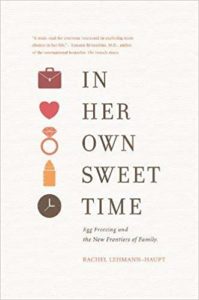
And about Story Made Studio here.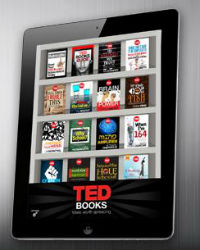
Podcast: Play in new window | Download
David Wilk talks with Lise Quintana of Lithomobilus
September 20, 2015 by David
Filed under Ebooks and Digital Publishing, PublishingTalks, Technology
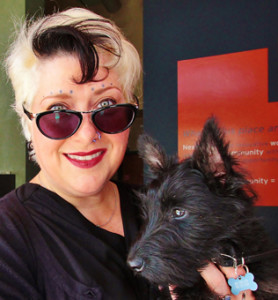 Publishing Talks began as a series of conversations with book industry professionals and others involved in media and technology about the future of publishing, books, and culture. As we continue to experience disruption and change in all media businesses, I’ve been talking with some of the people involved in our industry about how publishing might evolve as our culture is affected by technology and the larger context of civilization and economics.
Publishing Talks began as a series of conversations with book industry professionals and others involved in media and technology about the future of publishing, books, and culture. As we continue to experience disruption and change in all media businesses, I’ve been talking with some of the people involved in our industry about how publishing might evolve as our culture is affected by technology and the larger context of civilization and economics.
I’ve now expanded the series to include conversations that go beyond the future of publishing. I’ve talked with editors and publishers who have been innovators and leaders in independent publishing in the past and into the present, and will continue to explore the ebb and flow of writing, books, and publishing in all sorts of forms and formats, as change continues to be the one constant we can count on.
It’s my hope that these conversations can help us understand the outlines of what is happening in publishing and writing, and how we might ourselves interact with and influence the future of publishing as it unfolds.
As many listeners here know, I have an ongoing interest in experiments in technology that expand the writing experience for creators and of course then the reading experience as well. Honestly, while we have seen many attempts, thus far, not very many have captured the greater imagination of writers or readers.
The latest undertaking I have run across is Lithomobilus, founded by writer Lise Quintana, whose “online writing software gives authors the power to expand upon their existing works, create new works with built-in expansion opportunities, and craft amazing nonlinear works….Readers can then download the reader software and enjoy the first e-book reading experience that values words without slavishly following the format of a printed book.”
I’m ready to see what happens and I thought it would be fun to talk to Lise to find out more.
Creating compelling “interactive” fiction and new forms of storytelling is a hugely challenging undertaking. I found a comprehensive review of Lithomobilus by Emily Short, who knows a lot about new narrative forms, her blog is well worth reading. “There’s a core problem of interactive fiction design here: if you design a narrative where the intention is that the reader will read as much as she’s curious about and then stop, but you don’t communicate that she’s allowed to do that, she’ll continue exploring the story space past the point where she’s started to feel bored and then blame the author for that boredom. This is genuinely not easy to resolve, and it’s at the heart of what Lithomobilus appears to be trying to do: to offer stories that aren’t consumed completely, but yield more and more content in response to a reader’s desire, inexhaustibly, never saying that your experience is complete.”
I like Lise Quintana’s own piece of writing in the Lithomobilus app, it’s called The Strangely-Browne Episode, and even though it’s likely meant as a demonstration of the app’s capabilities, it is an engaging story. I know there are many who doubt that there is a “need” for new technology to create interactive reading experiences. It seems possible that even if it’s “better” storytelling, it may not be a mainstream sort of thing – recumbent bicycles come to mind here. They are demonstrably better riding devices than traditional bikes, but they will never be popular with more than a minority of riders, they take time to learn to ride, they look weird and they cost more. I think similar factors are at play with writing that tries to harness new technologies to tell stories differently. Too hard for most readers to learn, interactivity changes the reading experience from what is expected, and “costs” more time and effort than readers are willing to give. But for those who do want “something more”, apps like Lithomobilus do provide an opportunity that may be worth the effort to engage.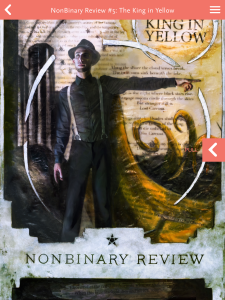
Lise’s publishing effort is called Zoetic Press, which publishes using the Lithomobilus app platform. She is Lise the CEO and founder of Narrative Technologies, which uses interactive and hypertext narrative tools to publish new kinds of literature. Quintana was formerly the editor-in-chief of Lunch Ticket, a literary journal of Antioch University Los Angeles. Previously she worked as a writer and project manager at various hardware and software companies in Silicon Valley. Quintana is on the Board of Trustees for Antioch University Los Angeles and formerly on the Board of Directors for Friends of the Santa Cruz Public Library.
Podcast: Play in new window | Download
Publishing Talks: David Wilk interviews Mark Teppo about The Mongoliad
October 11, 2011 by David
Filed under Ebooks and Digital Publishing, PublishingTalks, The Future
 In this ongoing series of interviews, called Publishing Talks, I have been talking to book industry professionals and other smart people about the future of publishing, books, and culture. This is a period of disruption and change for all media businesses. We must wonder now, how will publishing evolve as our culture is affected by technology, climate change, population density, and the ebb and flow of civilization and economics?
In this ongoing series of interviews, called Publishing Talks, I have been talking to book industry professionals and other smart people about the future of publishing, books, and culture. This is a period of disruption and change for all media businesses. We must wonder now, how will publishing evolve as our culture is affected by technology, climate change, population density, and the ebb and flow of civilization and economics?
I believe that these Publishing Talks conversations can help us understand the outlines of what is happening in the publishing industry, and how we might ourselves interact with and influence the future of publishing as it unfolds.
These interviews give people in and around the book business a chance to talk openly and broadly about ideas and concerns that are often only talked about “around the water cooler,” at industry conventions and events, and in emails between friends. These conversations give people inside and outside the book industry a chance to hear first hand some of the most interesting and challenging thoughts, ideas and concepts being discussed by active participants in the book business.
It’s likely that most listeners of this podcast series are aware of the innovative storytelling project called The Mongoliad. This project, a “transmedia” collaboration of several science fiction and fantasy writers, along with their readers, and others, is one of the more far-reaching experiments in digitally enabled fiction. There are many interesting practical elements to this project, including quality control, story and character continuity, and other issues of control. And there are economic questions as well.
There are all sorts of bigger issues in play here as well, including the notion of author, ownership of ideas and control issues in a collaborative crowdsourcing environment, and the nature of writer and reader in a community setting. Hopefully these issues will continue to be explored and discussed in many other venues.
Mark Teppo is the Chief Creative Officer for Subatai Corporation, which is the operator of The Mongoliad project. Mark plots and fabricates alternate versions of historical eras for this project and others. He is also the author of the urban fantasy series The Codex of Souls (Night Shade Books) and lives in Seattle. His other projects include: Darkline: An on-going research and commentary site dealing with esoterica and the occult and Psychobabel, a pair of non-linear texts—The Potemkin Mosaic and The Psychobabel Folio—the Psychobabel project explores the landscape of dream, the labyrinth of linguistics, and the deconstruction of mythology.
Just after I interviewed Mark for Writerscast, Amazon and Subatai announced that Amazon will be publishing the books related to The Mongoliad. I asked Mark to comment here to provide some additional context for our discussion. Here is what he said:
Regarding the deal with Amazon’s new SF/F imprint, we’re thrilled that they want to bring The Mongoliad to a larger audience. One of the
things that we’ve always said is that, for many of us, a book doesn’t really exist until you can crack it open and bury your nose in its pages. I grew up with books, and still have a house full of them. Rooms seem strangely naked if they don’t have books in them. Digital technology is coming to books, and e-readers are definitely going to change the market, but they don’t make physical books any less a critical part of our being. To that end, partnering with 47North (Amazon’s new S/F imprint) to be able to produce The Mongoliad as a physical book is simply part of what we always wanted to accomplish.
On a more practical side, the e-reading market is still in its infancy. Those of us who spend all day on the Internet easily forget that a significant part of the reading audience prefers physical texts. We’d be remiss in our efforts to entertain everyone if we didn’t make every effort possible to let them enjoy our stories as well. Amazon’s entry into the SF/F publishing space will allow us to put the entirety of the Mongoliad on the shelves in bookstores by the end of 2012, which–in publishing terms–is almost overnight.
I think you will find this discussion about The Mongoliad well worthwhile. It is a really interesting project being done by a very smart and accomplished group of people. I’ve enjoyed reading it as the series has evolved, and recommend it to anyone interested in historical fiction and visionary writing or who might be looking for inspiration to develop other innovative models for digital storytelling. 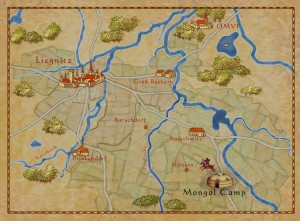
Podcast: Play in new window | Download
